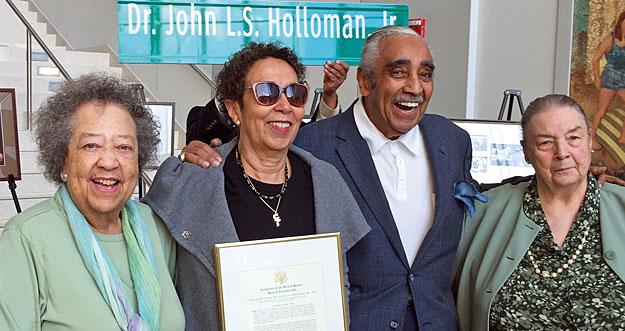NYC celebrates the memory of a warrior for social justice

The many contributions of Dr. John Lawrence Sullivan Holloman, Jr. to healthcare and civil rights were celebrated on April 18 at a ceremony where Congressman Charles Rangel co-named Harlem’s 135th Street near Madison Avenue in his honor. Dr. Holloman, who died in 2002, was the husband of NYSNA pension fund trustee Patricia Leo Holloman, RN, who worked at Mt. Sinai Hospital until her retirement in 2013.
The street naming recognizes Dr. Holloman’s extraordinary and unflagging efforts to improve healthcare for the poor and disenfranchised. He founded the Medical Committee for Human Rights (MCHR), the medical arm of the civil rights movement, after participating in Dr. Martin Luther King Jr.’s 1963 march in Washington, DC. Two years later, when Dr. King and thousands of civil rights marchers converged in Alabama for the voting rights march from Selma to Montgomery, the MCHR put out a call for volunteer doctors and nurses. Patricia Leo got on a plane and within 24 hours was a part of the MCHR. After the first day of marching, she tended to Dr. King’s blistered feet. She met her future husband and countless others who she said “forever changed the direction of my life.”
Fighting injustice
Dr. and Ms. Holloman were participants in many historical events of the civil rights movement, both in the south and the north, and battled injustice at home as well as in Vietnam and South Africa. In the mid-1970s Dr. Holloman was appointed president of New York City’s then four-year old Health and Hospitals Corporation. “He was a unique person with many skills. A true warrior for social justice,” Ms. Holloman recalled.
In his many medical leadership positions, including the presidency of the National Medical Association, he appealed to the medical profession to fight racial prejudice. He saw healthcare as a basic right and campaigned tirelessly for national health insurance. “Until we take the profit motive out of it and provide healthcare for all of our citizens,” he said in an interview with The Amsterdam News in 1995, “we are always going to have somebody who’s left out because there are so many people on whom there is no profit to be made.” Dr. Holloman’s words ring as true today as when he spoke them twenty years ago.